

The best place for information about TM Network and their history is going to be TM Next, the official TM Network site. There's also a lot of great info on TM Network on the Sony Music Entertainment page. If you can get a hold of any TM Network books, Final 4001 is the book that covers their entire history. It's the size of a textbook and has a lot of great pictures too. So here's my recap of the history that I've learned.
Utsu and Kine have known each other since elementary school, and they're still friends. They began a band called Speedway in 1976. (By the way, I plugged the Speedway page through the automatic translator for you. The Japanese page is this.) In 1977, TK met Utsu, Kine, and Aoki (TM Network's manager) at a concert and officially joined Speedway in 1980. If you count that, they've been together for a very long time, even if it wasn't always under the label of TM Network.
TK first approached Kine about making music mostly from computers. Utsu was selected as their trusted vocaist. In May 1983, TM Network won full honors in the Fresh Sounds Contest with the song 1974, which was not their debut single but their second single. A clip of the Fresh Sounds Contest is available at the end of the DVD Decade. (They're not ashamed of anything they've done despite the passage of time.) They debuted the next year, on April 21, 1984, with Kinyoubi no Lion (Friday's Lion).
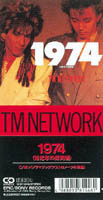
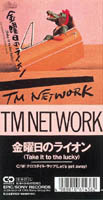
They would continue setting new trends that, even today, are apparent in the music scene. They concentrated heavily on image from the very start. In fact, you could say that they were the first visual band in Japan. From exclusive hair stylists to innovative lighting on the concert stage, TM Network paved the path. As I understand it, TM Network made the charts with Come On Let's Dance, hit #1 on the charts with Self Control in 1986, and thereafter became a regular winner on the top charts. But it's not until Get Wild in 1987 that they became a record-setter. This was one of the ending themes for the City Hunter anime. The next year, they did Beyond the Time for Gundam: Char's Counterattack. Because of the population boom and inflation, it's not fair to compare total sales or millions made between TM Network of old and Jpop bands of new. Suffice to say, at the time, they were the biggest thing around. (And there'll be a basis of comparison if they become big again.)

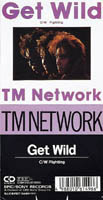
I think one of the coolest things they did was Carol. In 1988, Kine came out with his first novel, Carol. TM Network came out with an album by the same name. And later, when they did the Carol tour, they tried to play out the storyline, like a musical. Sure musicals do that, but this is a rock band! Later still, in 1990, they came out with a Carol anime, but I like the live action/concert clip that I saw in Decade better because the music really is downplayed in the anime. It would've been better if Carol the anime had been a long music video. But even so, I appreciate the novelty of what they did. Since Carol, Kine has published a lot more books.

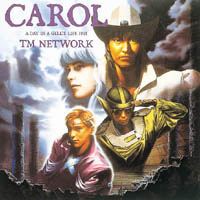
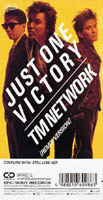
Man, this TM Network history lesson is starting to sound like a discography, but for a band, what else do you expect? Onward! Also in 1989, TM Network released three singles at the same time: Come on Everybody, Kiss You (Kiss Japan), and Get Wild '89. All three made it to the top 10 chart, a first in Japanese music history.
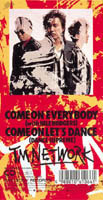

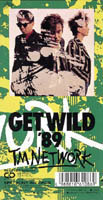
It's rare for any Japanese band or singer to last more than five years. Well, in 1990, TM Network renewed itself as TMN. They weren't through yet. Under TMN, they devoted themselves to hard rock. They put out Rhythm Red, and the album included such classics as Time to Count Down and 69/99. There's a lot of cheating these days. Many singers and groups, because they aren't destined to last very long, will put out a lot of singles which make it to the top 10 chart, but they can't gather enough songs for too many albums. Well, that isn't the case here. TMN did include a lot of remixes of their songs in their later albums, but Rhythm Red and Expo were all new songs. Love Train, in 1991, is a song that would sound sappy if sung by any other singer, but Utsu's a strong enough vocalist that the song is great.


But TM members had solo projects going, as they did before the TMN renewal. In 1992, they didn't put out any new single. Not a good sign. They came out with Ichizu na Koi in 1993. (Utsu says he likes this tune best of all.) But in April 21, 1994, on the anniversary of their debut, they announced the end of the TMN project. They put out their last single, Nights of the Knife, on this day.


On May 18 and 19 of 1994, TMN held their last concert at Tokyo Dome. They compressed ten years into two days. Likewise, Decade compresses ten years into two hours. All three are available on DVD and well-worth the price. At the very end, on 5.19, for an encore, TMN presented a completely new song that had not been released as a single or in any album. The encore song was Time Machine. The TM in TM Network/TMN stands for Time Machine. In this very touching song, they said, "those who know us will wait." It was a hopeful promise, one they later fulfilled.
If it had ended there, TM Network would've made history, but they wouldn't be as special to me as they are now. Even when they ended the TMN project, they never used the word "disband." Since then, TK became the most powerful producer in Japan and a one man, billion-market business. I was told that "money does not change a man, money reveals a man." All three TM members were very wealthy at this point, and TK was outstripping the popularity of TM Network, at one time holding seven of the top ten slots with his various artists. Despite this, in 1999, TM Network did, indeed, restart.
Now here's my side of the story, purely speculation. TK reached his peak in 1997ish, and it's impossible to stay on the top forever, especially with the records that he'd set. With the appearance of new singers, TK comes under attack. However, he wants to be a musician, not just a man in show business. Globe puts out a concept album, and as can be expected of a concept album, sales are low. Still higher than a minor band's sales, but low for the phenomenon that was Globe. I think TK must've felt a bit of pressure. I know he started expanding into other Asian markets. Without a doubt, he's still successful, just not as overbearing as he was at the height of his power. But he gets a lot of criticism for not putting out all top ten on the charts, or even seven out of ten. In my mind, because of the bond of friendship I sense from those three, I imagine TK returning to TM Network as a sort of consolation. He's set his own style, and because of it, people start thinking that his music all sounds alike. Since TM Network, he hasn't produced a male singer nearly as powerful as Utsu. Perhaps somewhere in there lies one of many reasons for TM Network's return. They'd reunited as an event thing on many occasions, even putting out Detour in 1996. But with his other projects, like Globe, it becomes public property because the songs are made for karaoke. Even TK said it, TM Network is like their own selfish property. They can make music in their own way.

But 1999 was a hard year for them. They were still busy with individual projects. And Utsu's father passed away. Despite this, they were able to put out such singles as Happiness x3 Loneliness x3, Get Wild Decade Run, and 10 Years After. They didn't lose their edge or give up. In the year 2000, just last year, they did their Log-on to 21st Century concert, put out several singles that would later be compiled into Major Turn-Round, and began their Major Turn-Round concert tour. It's been a busy year for them, but their music is better than ever. When TK asked Kine to write a song for MTR, Kine thought, this is the real restart. He became emotional and came up with We are Starting Over. And TM Network didn't just join the TK family. They specifically signed on with TrueKissDisc instead. There's still equality in their relationship, even if TK is and always has been the band leader.
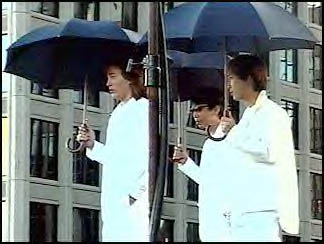
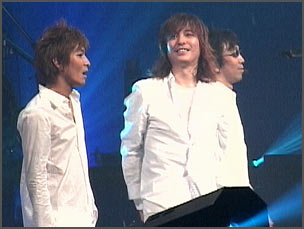

I wonder if it's obvious yet why I love them. Maybe not in a history lesson that must retell their discography. It doesn't do them credit. Let's go back to the beginning for a brief moment. Kine and Utsu have been friends since childhood. They met TK when he was 19, and they've managed to stay friends ever since. This is not a pretense. Despite being successful, they haven't become tense with jealousy the way other bands might. Utsu is the main vocalist, very noticeably so. That is the heart of TM Network, and understandably so as Utsu's voice is so powerful. When TK or Kine write a song, they keep Utsu in mind, knowing that he can express the sentiments they feel. They don't try so hard to be deep that they don't make sense. Such lyrics as "It's your pain or my pain or somebody's pain" or more recently "Never be the same, never be the same, never be the same, turn round" are amazing. I feel that, in all their songs, there is a message of hope. And when I look at TM members and their strong friendship, I do feel hope. Even if I personally never experience such deep friendship, at least I know it's not a myth. It really exists.
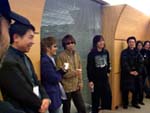
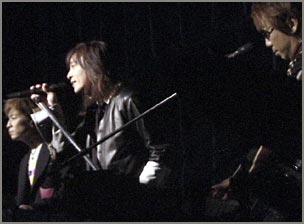

It's not just history that is in the past. TM Network is back. It may take some time, but they will become popular once again. Theirs was a project that involved music created from digital machines, and their contribution in that area changed Jpop. "The reason why TM Network is restarting again is that this is an age that they, more than anyone, have long awaited." If you think about it, they pushed those old computers to the max to mix their songs, and now that technology has advanced as far as it has, they do deserve to enjoy this time.
Home / TM Network / Iceman